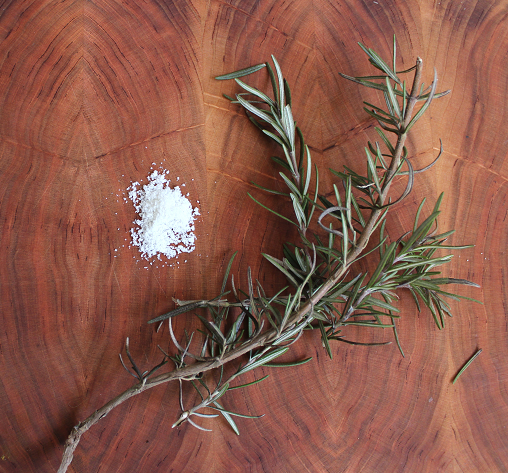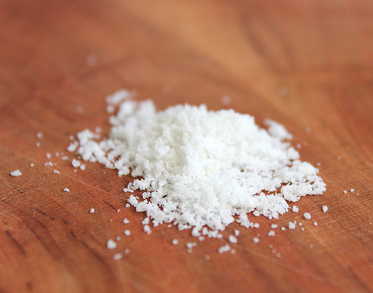
sea salt & rosemary
When it comes to table salt vs. sea salt, what’s the difference and which one should you use?
the lowdown
TABLE SALT
Regular ol’ table salt is highly processed. It’s refined and stripped of all its nutrients, then artificially enhanced with anti-caking additives (which in my opinion are completely unnecessary). The refining process retains the sodium but makes it otherwise devoid of any other nutrition.
Table salt also contains added iodine, which if consumed in excess has the potential to wreak havoc on your thyroid.
Unfortunately, this is the salt that’s most commonly found in the shakers on dinner tables and in restaurants across America.
SEA SALT
On the other hand, sea salt is harvested (often by hand) by evaporating water from the ocean and is usually unrefined– thus retaining a whole slew of healthful naturally occurring trace minerals and elements.
The different minerals contained in sea salt also impart it with more delicate and varying flavors, depending upon where it was harvested and the percentages of the various minerals it contains.
the verdict
Personally, I am a huge proponent for choosing whole foods and minimally processed foods– and I believe that when it comes to salt your choice should be no different.
So when it comes to table salt vs. sea salt, I think the answer is clear: sea salt is the winner.

sea salt
(side note: Remember, Like many things in life and certainly when it comes to your diet, it’s always best to practice moderation. So even if you’re already consuming what I believe to be the better salt, it’s still important not to go overboard.
Table salt and sea salt contain relatively the same about of sodium—and too much sodium can be a cause of hypertension [high blood pressure]– so always taste your food before you salt it—it might not need it!)
Now I want to know– which do you think is better and which do you use: table salt or sea salt?
Have something else to add? Tell me in the comments below!
Also, please share on social media if you think anyone you know might benefit from this!

Sea salt rocks! Love the texture & taste–no comparison to “regular” salt!
Oh I completely agree,sea salt is the way to go. I hadn’t known what a distinct difference existed between the two. Keep the great posts comin’.
I definitely agree that sea salt is more flavorful. I use both, but most of all I use kosher salt for cooking. What is your opinion of kosher salt? Also, since sea salt is unrefined, does that mean it could contain weird stuff that floats around in the ocean, like fish poo? Haha!
Anna – like table salt, kosher salt is also processed & refined so it does not contain all the minerals like sea salt does. It does not usually contain the added iodine or anti-caking agents like table salt does though… but sometimes it still does! so you always have to read the label.
Also, I find this interesting: kosher salt may either be 1) kosher-style salt – it’s called “kosher” because it’s the kind commonly used in the process to make meat kosher, not because the salt itself was made under kosher guidelines and 2) kosher certified salt – which is actually produced under kosher guidelines. You’ll have to read the label to see which kind it is (if it matters to you!)
When it comes to sea salt, since it is a natural thing it’s bound to contain organic matter of all kinds in tiny amounts, but I don’t think it’s something one should be worried about– unless you are allergic to crustaceans (which sea salt can contain).
Hello again! Yesterday I refilled our salt shaker with sea salt, so we can try and avoid table salt whenever possible, and 2 additional questions came to mind — maybe you can point me in the right direction!
1. Since sea salt doesn’t contain iodine (which the table salt processors stress is a vital nutrient people need), where else can I get it in things i might eat or drink every day?
2. Have you ever substituted sea salt for table salt when baking? Since sea salt is more salty than regular salt, do you simply use less, just as you would use less honey than sugar in a recipe due to its more potent sweetness? Also, would substituting it for table salt mess up the chemical reactions going on that are so important in baking?
Hello!
You do not need as much iodine as the processed salt companies would have you to believe.
Iodine is a trace mineral so you only need it in very teeny tiny amounts, and in my opinion the best source for it is seaweed! So if you eat sushi every so often you’re probably getting plenty of iodine! Also, I have a little shaker in my kitchen of dulse flakes, that I occasionally sprinkle on foods like sauteed veggies, etc. – the seaweed flavor is not super strong, and I know I’m getting lots of beneficial minerals from it! So you could try that : )
In the words of my BFF Sass who has a degree in nutrition & dietetics: “Whole food sources are always better and the best way to ensure you’re meeting your nutritional needs is to eat a highly varied diet.”
And yes, I only use sea salt (or another natural salt, like Himalayan pink salt, etc.) in baking, and you don’t have to reduce or change the amount. Just use as you would the normal table salt!
I like sea salt better too. anticaking ingredients are gross!